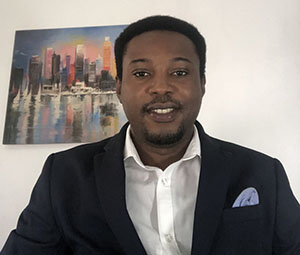Articles
Making the Move From Engineering to FP&A
- By Bryan Lapidus, FP&A
- Published: 11/13/2020

A major trend that AFP has been tracking for years is professionals migrating into the FP&A profession; with many coming from accounting. Increasingly, we see the growth of non-finance professionals joining FP&A teams. We are seeing IT and data professionals join FP&A—more on this will be available in our December FP&A survey report—and recently I had the chance to talk to Kwaku Agyemang-Duah, Senior Manager of FP&A at AirtelTigo Ghana about his transition from engineering to FP&A.
Bryan Lapidus: When you and I first chatted over Zoom, you had a bright picture of a city skyline behind you. What does that picture present to you?
Kwaku Agyemang-Duah: It represents a futuristic African city with lots of skyscrapers and it serves as a constant reminder of a somehow difficult childhood but a stronger willingness to be part of the generation who are changing the African narrative.
My dad traveled to Europe when I was barely six years old, so as a child, I formed a natural bond with my grandfather who taught me many valuable lessons. The most important one was living a purposeful life—the desire to be part of something greater than yourself, the willingness to share and make your environment and people around you better than you met them. He passed away when I was 12 years old, but he left an indelible mark on my heart to become a world changer.
Growing up, I have always had interest in science. I studied mathematics, physics and chemistry at Prempeh College, one of the best secondary schools in Ghana. I went on to pursue my first degree in electrical and electronic engineering, focusing on telecommunication in my final year. I travelled to the UK after university but quickly returned to Ghana to complete my national service. I started my career as a telecom engineer with the sole purpose of helping to enhance the lives of people in Africa through the power of digital connectivity. I’m a firm believer in Shared Prosperity and the collage that hangs on the wall in my study always reminds me of the task ahead.
Lapidus: You have a strong belief in building something great for the future. Why did you then transition from engineering to finance?
Agyemang-Duah: I made the bold decision to transition from engineering into finance because of an incident which happened when I traveled to Democratic Republic of Congo as an expatriate.
In 2012, I joined a telco in DRC as the value-added platform manager. I managed all their billing, value-added and mobile financial systems. Helping to enhance the lives of people and businesses beyond Ghana was gradually becoming a reality. This really motivated me to work harder. I worked with cross-functional teams to ensure reliable delivery of digital services to our customers, constantly coming up with ideas on how to make life simple and easy for customers.
I went to work one fateful morning and the CEO called for a general meeting. We were informed that the company had been sold to another entity on the premise of an opportunistic sale. I found out later that the op-co was not self-sufficient after several years. The incident served as a wake-up call from being operationally biased and created in me an outsized amount of curiosity in finance and strategy. I decided to help in steering companies in the right strategic direction and build profitable, long-lasting businesses.
In hindsight, I will say the transition has given me more power and influence to keep the original goal alive.
Lapidus: What do engineers have to offer to FP&A?
Agyemang-Duah: As an engineer, I had developed lots of transferable skills and attributes over several years. This included creative problem-solving, paying attention to details, the ability to handle large sets of data, coding, automating routine processes, and managing projects and stakeholders. I have always been faced with the task of trying to identify which error codes in system logs will lead to serious system failures, using Linux scripting and other heuristics (analytics) to predict likely failures and build in preventive mechanisms. Most engineers will bear me out that this has always been our world before the terms ‘big data’ and ‘predictive analytics’ became extremely popular.
Observing global financial trends, I have realized the overwhelming responsibility of business performance management (BPM) placed on the shoulders of CFOs. The arduous challenge of attempting to predict the future with a greater level of certainty in this VUCA era and coming back to the present to lay several pathways that would lead to business success has been placed on the CFO and the FP&A team. This, I believe, has necessitated the need for CFOs to also look outside the traditional finance functions for extra talent. And given the intersection of required skills and attributes by FP&A and those already exhibited by engineers, I will say creative engineers have more to offer the finance function.
Relating these points to my own journey, I will say I’m very curious and fond of asking a lot of questions especially pertaining to the future, so having observed me for a while, our CFO, Mr. Prince Acheampong, decided to get me into the FP&A team with the key responsibility of helping to drive business performance. He understood very much BPM and felt that with my background—a customer-centric engineer with analytics capabilities and a passion to drive companies in the right direction—with just the right financial grooming, I would be very instrumental to his finance transformation plans.
Joining the FP&A team, I would humbly say that my addition has proven worthwhile. We have seen massive improvement in variance analysis and management reporting; growth in active subscribers; and reduction in subscriber churn, resulting in improvement in revenues through collaboration with various stakeholders. Through the power of analytics, the CFO goes into meetings fully armed with what is happening behind the numbers, why it is happening, what is likely to happen, and what we must do.
Lapidus: You have said that that people in finance did not always accept your engineering credentials. Why is that? What have you done to prove yourself?
Agyemang-Duah: When I joined the FP&A team, I had a countless number of finance folks ask if I had an MBA in finance. Each time I answered no, and I saw on their puzzling faces the seeming question of ‘What are you then doing here?’. I quickly realized that, as any technical function would demand, credentials really mattered to finance folks. To be accepted into this world, I needed to also prove that I have the right accolades.
I have since completed several online courses including financial accounting, pricing strategy, decision-making and scenarios, quantitative modelling and business analytics with Wharton Online and IE (Coursera). I am bound to complete my FMVA certification and have obtained 90% plus in more than 12 courses on first attempt. In addition to that, I have been a ferocious reader of business and financial articles on LinkedIn and other sources. In a month, I participate in not less than four webinars and I must admit I have learned a lot more with the last two approaches than the former.
Lapidius: What comes next for your career path? For your professional development?
Agyemang-Duah: I aspire to get to the pinnacle in my career—to have considerable influence among those who have seats around the decision-making table in an organization. The path I currently envisage is moving from my current role as a senior manager to a director role in FP&A or analysis and strategy onto a CFO/COO role within the next five to seven years. I’m very passionate about sharing information, so I have already started sharing articles on LinkedIn and plan to be a regular writer.
After completing the FMVA certification I plan to complete the Certified Analytics Professional certification and the Certified Corporate FP&A Professional designation next year to further enhance my knowledge and skill in analytics, which I believe is a key success recipe for the modern FP&A professional. I’m saving money to embark on leadership programs with Ivy schools like Wharton, IE, etc. to boost my leadership skills and credentials. In the meantime, I am seriously developing my business partnering skills to be able to influence and drive the right decisions that will result in better business performance.
For more insights on how you can progress in your finance career, visit the AFP Career Hub.
Copyright © 2024 Association for Financial Professionals, Inc.
All rights reserved.

